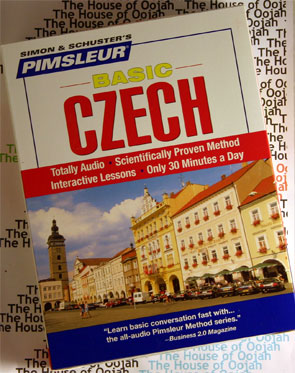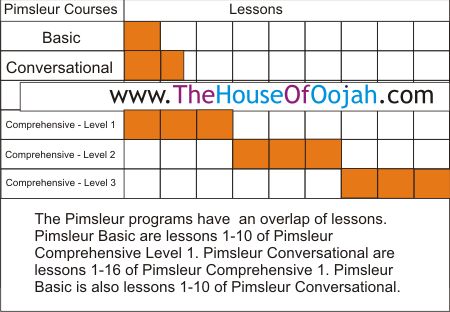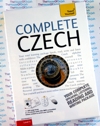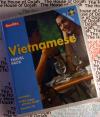Pimsleur Basic Czech Language 5 AUDIO CD's -Discount - Learn to Speak Czech

Pimsleur Basic CzechTotally Audio - only 30 minutes a day 5 CDs |
 |
Pimsleur Basic Czech - 5 Audio CDBrand New : 5 CDsThe Pimsleur Method provides the most effective
language-learning program ever developed. The Pimsleur Method gives you quick
command of Czech structure without tedious drills. Learning to speak Czech
can actually be enjoyable and rewarding. The key reason most people struggle with new languages is that they aren't given proper instruction, only bits and pieces of a language. Other language programs sell only pieces — dictionaries; grammar books and instructions; lists of hundreds or thousands of words and definitions; audios containing useless drills. They leave it to you to assemble these pieces as you try to speak. Pimsleur enables you to spend your time learning to speak the language rather than just studying its parts. When you were learning English, could you speak before you knew how to conjugate verbs? Of course you could. That same learning process is what Pimsleur replicates. Pimsleur presents the whole language as one integrated piece so you can succeed. With Pimsleur you get:
Millions of people have used Pimsleur to gain real conversational skills in new languages quickly and easily, wherever and whenever — without textbooks, written exercises, or drills About the Czech LanguageCzech is one of the West Slavic languages, along with Slovak, Polish, Pomeranian (Kashubian), and Lusatian Sorbian. It is spoken by most people in the Czech Republic and by Czechs all over the world (about 12 million native speakers in total). Czech is relatively close to Slovak and, to a lesser degree, to Polish or to Sorbian in East Germany. Because of official Czechoslovakian government policies of broadcasting in Czech and Slovak for several decades, the generations born until the mid 1970's can understand both languages very well. Later generations progressively understand each other less. Children who learned Czech or Slovak after the 1993 split, have more problems understanding the other language. Czech television, in particular the commercial channels, are still quite popular among audiences in Slovakia. Meanwhile, due to some immigration from Slovakia, the Slovak language may be heard within the Czech Republic. As in most Slavic languages (except common nouns in modern Bulgarian and Macedonian), many words (especially nouns, verbs and adjectives) have many forms (inflections). In this regard, Czech and the Slavic languages are closer to their Indo-European origins than other languages in the same family that have lost much inflection. Moreover, in Czech the rules of morphology are extremely irregular and many forms have official, colloquial and sometimes semi-official variants. The word order serves similar function as emphasis and articles in English. Often all the permutations of words in a clause are possible. While the permutations mostly share the same meaning, it is nevertheless different, because the permutations differ in the topic-focus articulation. As an example we can show: Češi udělali revoluci (The Czechs made a revolution), Revoluci udělali Češi (It was the Czechs who made the revolution), and Češi revoluci udělali (The Czechs did make a revolution). The phonology of Czech may also be very difficult for speakers of other languages. For example, some words do not appear to have vowels: zmrzl (froze solid), ztvrdl (hardened), scvrkl (shrunk), čtvrthrst (quarter-handful), blb (fool), vlk (wolf), and smrt (death). A popular example of this is the phrase "strč prst skrz krk" meaning "stick a finger through your throat" or "Smrž pln skvrn zvlhl z mlh." meaning "Morel full of spots wetted from fogs". The consonants l and r can function as the nucleus of a syllable in Czech, since they are sonorant consonants. A similar phenomenon also occurs in American English, where the reduced syllables at the ends of "butter" and "bottle" are pronounced [bʌ.ɾɹ] and [bɑ.ɾl], with syllabic consonants as syllable nuclei. It also features the consonant ř, a phoneme that is said to be unique to Czech and quite difficult for foreigners to pronounce. To a foreign ear, it sounds very similar to zh, though a better approximation could be rolled (trilled) r combined with zh, which was incidentally sometimes used as an orthography for this sound (rž) for example in the royal charter of Rudolf II, Holy Roman Emperor from 1609. The phonetic description of the sound is "a raised alveolar non-sonorant vibrant" which can be either voiceless (terminally or next to a voiceless consonant) or voiced (elsewhere), the IPA transcription being [ r̝ ], however this is contested as not representing the ř sound properly. |
Pimsleur Basic Czech - 5 Audio CD |


 0 Items (Empty)
0 Items (Empty)



